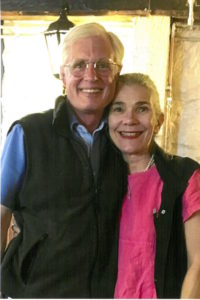Paul, a servant of Jesus Christ, called to be an apostle, set apart for the gospel of God, which he promised beforehand through his prophets in the holy scriptures, the gospel concerning his Son, who was descended from David according to the flesh and was declared to be Son of God with power according to the spirit of holiness by resurrection from the dead, Jesus Christ our Lord, through whom we have received grace and apostleship to bring about the obedience of faith among all the Gentiles for the sake of his name, including yourselves who are called to belong to Jesus Christ,…. (Romans 1:1-6)
Now to God who is able to strengthen you according to my gospel and the proclamation of Jesus Christ, according to the revelation of the mystery that was kept secret for long ages but is now disclosed, and through the prophetic writings is made known to all the Gentiles, according to the command of the eternal God, to bring about the obedience of faith — to the only wise God, through Jesus Christ, to whom be the glory forever! Amen. (Romans 16:25-27).
The Obedience of Faith
 Our Sunday school class has been busy studying Paul’s letter to the Romans. In many Sunday school classes, such a study takes place over a long period due to the length and complexity of this wonderful letter. Our class decided to take another approach: Instead of covering the book sentence by sentence over a long period, we decided to cover it over fourteen weeks. One benefit of that approach has been the need for the teaching team to identify central messages and meanings to communicate to the class. It was my duty to teach the first lesson. In so doing, I concluded that the book is primarily about a phrase used at the beginning and the end of the book. That phrase is “the obedience of faith” (Romans 1:6; 16:27).
Our Sunday school class has been busy studying Paul’s letter to the Romans. In many Sunday school classes, such a study takes place over a long period due to the length and complexity of this wonderful letter. Our class decided to take another approach: Instead of covering the book sentence by sentence over a long period, we decided to cover it over fourteen weeks. One benefit of that approach has been the need for the teaching team to identify central messages and meanings to communicate to the class. It was my duty to teach the first lesson. In so doing, I concluded that the book is primarily about a phrase used at the beginning and the end of the book. That phrase is “the obedience of faith” (Romans 1:6; 16:27).
Paul was the first missionary to the Gentiles and proclaimed a doctrine of salvation by faith alone. This, in turn, produced the early church’s first major conflict, which revolved around the question of whether Gentiles needed to adhere to Jewish law, including circumcision, before embracing Christianity. The church’s decision, reached during the first great conference in Jerusalem, as recorded in Acts, was that Gentiles did not need to convert to Judaism before becoming Christians (Acts 15:1-29). This decision had to do with circumcision and implies that what is being spoken about is the ceremonial law. However, the issue of the law’s relationship with faith continued to perplex and trouble the first-century Church—and it can trouble us today.
In a culture that celebrates freedom and often celebrates liberty from any kind of traditional morality or forms of behavior, it can be challenging to hear a phrase like “the obedience of faith.” Nevertheless, we need to hear and understand that phrase, or we are almost certain to act unwisely in the Christian life. A good deal of the foolishness of contemporary Christians can be traced back to a failure to understand what we are forgiven for and freed for when we come to Christ.
Paul’s “Torah Free Gospel”
 In Romans, Paul is concerned with ensuring that the Roman church is not confused about where Paul stands on the issue of faith and the connection between faith, works, and the law. At the beginning of the book, he sets for his program: Paul has been called as an apostle to proclaim the gospel of Christ and bring about the obedience that comes from faith. Faith allows believers to be transformed and, therefore, can live according to the moral law. Faith does not eliminate the law; it is the vehicle by which the law can be fulfilled in the life of believers.
In Romans, Paul is concerned with ensuring that the Roman church is not confused about where Paul stands on the issue of faith and the connection between faith, works, and the law. At the beginning of the book, he sets for his program: Paul has been called as an apostle to proclaim the gospel of Christ and bring about the obedience that comes from faith. Faith allows believers to be transformed and, therefore, can live according to the moral law. Faith does not eliminate the law; it is the vehicle by which the law can be fulfilled in the life of believers.
In Galatians, Paul spoke dramatically about Christians’ freedom from the law. As a result, he was seriously criticized by Jewish Christians, who did not believe in the revelation of Christ abrogated the Jewish law and would inevitably lead to rampant immorality. In Romans, Paul assures the Roman church that nothing could be further from the truth. Thus, Paul writes:
What shall we say then? Are we to continue in sin that grace may abound? By no means! How can we who died to sin still live in it? Do you not know that all of us baptized into Christ Jesus were baptized into his death? We were buried, therefore, with him by baptism into death so that, just as Christ was raised from the dead by the glory of the Father, we too might walk in the newness of life. If we have been united with him in a death like his, we shall certainly be united with him in a resurrection like his. We know that our old self was crucified with him so that the body of sin might be brought to nothing so that we would no longer be enslaved to sin. For one who has died has been set free from sin Romans 6:1-7).
Paul is clear: Our freedom from the law resulting from faith in Christ is not freedom to sin or do what we like. It is freedom from sin and the “Law of Sin and Death.” It is as if Christians, when they become believers in Christ, experience a kind of death. Their former sinful self is now dead, and in replacement, a new spiritual self has been created by God. That new spiritual self can fulfill the law, which the Old Testament law could not provide. The new creation in Christ is set free from the Law of Sin and Death and can live in the newness of God’s divine life.
Four Meanings of Law in Romans
As I’ve taught, I’ve been able to help the class understand four different uses of the law Paul uses in Romans. Historically, Reformed theology held that there were three types of law revealed in the Old Testament: moral, ceremonial, and civil (or judicial):
- The Ten Commandments exemplify moral law. They are permanently applicable today, and they still bind Christians.
- The ceremonial and civil law contains ceremonial (liturgical) and political laws applicable only to the Jewish people. It was temporary and is not binding on the church today.
It is also vital to understand another phrase used in Romans: “the law of sin and death.” The apostle Paul refers to the law of sin and death when he says, “Therefore, there is now no condemnation for those who are in Christ Jesus because through Christ Jesus the law of the Spirit who gives life has set you free from the law of sin and death.” (Romans 8:1-2).
In Romans, Paul contrasts the “Law of the Spirit” and the “Law of Sin and Death.” When Paul uses the phrase “the law of sin and death,” he recalls Adam and Eve’s story in the garden. Remember the consequences of Adam and Eve violating the commandment of God not to touch the tree of the knowledge of good and evil death (Genesis 3:2). Scholars can argue about what is included in this judgment of God, but it at least consists of spiritual death. That is to say, those who disobey God create for themselves a separation from God, a kind of spiritual death. This spiritual death can be undone by faith in Christ. The Law of the Spirit frees believers from the law of Sin and Death and results from believers receiving the Good News, the message of new life through faith in the resurrected Christ, followed by receiving the Spirit of God in their lives.
In Romans 8, Paul clearly states his view:
Therefore, there is now no condemnation for those who are in Christ Jesus because, through Christ Jesus, the law of the Spirit who gives life has set you free from the law of sin and death. For what the law was powerless to do because the flesh weakened it, God did by sending his own Son in the likeness of sinful flesh to be a sin offering. And so he condemned sin in the flesh so that the righteous requirement of the law might be fully met in us, who do not live according to the flesh but according to the Spirit (Romans 8:1-4).
Faith allows believers to be transformed and, therefore, have the capacity to live according to the moral law. The law alerts Christians to our sinful predispositions and points out the danger of falling into sin. In our natural condition, Christians are no more able to carry out the law than the Jewish people of the Old Testament. In our natural condition, Christians are no more able to carry out the law than Jewish people of the Old Testament. It is only by the power of the Holy Spirit that Christians can fulfill the law, and this is not an act of will but primarily an act of faith, the spirit working through the lives of believers. The law of the Spirit gives spiritual life to believers and sets us free, not from the moral law, but from the law of sin and death. Furthermore, once free from the law of sin and death, we no longer live according to our natural desires but according to the Spirit and, therefore, can fulfill the law’s righteous requirements.
Love Fulfills the Law
This short blog is not intended to be a complete theological discussion of what it means to fulfill the law. Still, it’s important to remember that Paul says that the law itself is summarized by the Great Commandment, especially by loving others. In Romans 13, Paul states:
Let no debt remain outstanding except the continuing debt to love one another, for whoever loves others has fulfilled the law. The commandments, “You shall not commit adultery,” “You shall not murder,” “You shall not steal,” “You shall not covet,” and whatever other command there may be, are summed up in this one command: “Love your neighbor as yourself.” Love does not harm a neighbor. Therefore, love fulfills the law (Romans 13:8-10, emphasis added).
It is love that fulfills the law. When believers receive Christ, they receive God into their hearts. When they receive God into their hearts, they receive the love of God because God is love, and they are empowered to love God and others (I John 4:7-21). Therefore, in loving God and others, Christians fulfill the law. But if we fail to do so, if we fall away from the love of God and others, we do not fulfill the law.) Notice, however, that this law of the spirit is not another law of the type one finds in the Old Testament. It is the spirit of God active in the life of believers. Love fulfills the law; it is not some kind of new law containing a lot of rules and regulations.
I hope this short look at portions of the book of Romans will help readers understand that the Christian life is not lawless. It is not as if the moral law we find, for example, in the Ten Commandments, has ceased to be applicable. The law is eternally relevant. By faith, Christians receive something even better than the law: the Spirit.
The spirit of God allows us to fulfill the law as we become more like Christ, who himself was the fulfillment of the law. He says, “Do not think that I have come to abolish the Law or the Prophets; I have not come to abolish them but to fulfill them” (Matthew 5:17). I like the New Living Translation even better: “Don’t misunderstand why I have come. I did not come to abolish the law of Moses or the writings of the prophets. No, I came to accomplish their purpose.”
By faith in Christ and loving God and others, we, like Jesus, can fulfill the law. The law becomes more or less irrelevant because we act by the power of the Holy Spirit in love, which transcends the law. It doesn’t repeal the law, but it’s bigger than the law. It is even more fundamental than the law. First, John tells us that God is love and light (I John 1:5; 4:8). It doesn’t say “God is law” because the law is not fundamental. Wisdom and Love are.
Copyright 2024, G. Christopher Scruggs, All Rights Reserved


